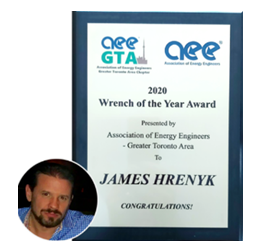Challenge Tips and Tricks were shared in the following webinar which was made available from BOMA:
http://www.bomatoronto.org/awards/awards-overview/earth-hour-weekend-challenge
Energy@Work has worked closely with BOMA over the last 10 years, since the challenge’s inception, because of the results we see each year. Moreover, we support the way it brings people together to celebrate what can be accomplished, in a short window, when a collective group targets energy reduction.
There are 2 very distinctive tactics in supporting the challenge:
1) Management and Operations:
Ryan Ounjian of DREAM Property Management, asked:
“What can the building staff do to reduce kWh while respecting the key E-MAP objectives of: Safety, Tenant Comfort and Equipment Reliability?
We cannot afford to have unintended consequences.”
Understanding kWh use, particularly during unoccupied periods is a great way to identify waste as well as reduce electricity costs.
Here are a couple of additional suggestions:
1.1 Review and update your Current Facility Requirements (CFR)
For example, are the occupied and un-occupied hours of operation updated?
1.2 Review the ieso suggestions. The ieso is responsible for Ontario’s Conservation and Demand Management and use ratepayer dollars, collected from the monthly Global Adjustment charge, to provide the following type of resources.
1.2.1 ieso: Seven red flags you are wasting energy@work
1.2.2 ieso Understanding your business’s electricity data
1.3 A practical approach is to review the hourly electricity use profile (kWh) and attempt to match end use loads and compare with actual requirements.
We review these at our E-MAP meetings and look forward to hearing what others discover.
2) Tenant Action:
Jeri Mckelvie from Menkes Property Management, asked:
“How to support tenants in encouraging occupants to shut off their systems when not in use?”
These are behavioral, difficult and requires an on-going awareness campaign. Tactics can evolve through a program, such as Building Beyond Green (BBG)©
It is very challenging to introduce in the short term, but the Challenge Tips and Tricks webinar and the Tips and Tricks Out of Office Energy Savings video are great starting points. This can also be tied into a tenant or occupant ‘return to work’ strategy, for better occupant support and tenant buy-in.
Good luck and don’t forget to mark your calendars! The challenge takes place:
Friday March 24th @ 6:00pm to Monday March 27th @ 6:00am!
Energy@Work will join others in the energy industry at AEEGTA’s annual networking and awards event. The event provides an opportunity to reconnect and celebrate. This year’s chapter award winners for Wrench of the Year and Energy Manager of the Year will be announced!
We hope to see you at Elephant and Castle (212 King St W) on March 8th from 5-8PM.
ESG has become a buzzword in the investment community, and for good reason. With rising costs and the climate crisis to consider, an effective, and verified ESG strategy must be in place. “Greenwashing” or “Green sheen” are plaguing ESG efforts and causing confusion as to where real efforts are being made. ESG’s popularity has risen so quickly, across so many sectors, that proper reporting and disclosure methodologies can’t keep up.
Adherence to Efficiency Valuation Organization’s IPMVP guidelines provides a cost-effective approach to support energy efficiency, as an example. It is critical to ensure that an ESG strategy is taking you in the right direction by creating a plan with a qualified team and verifying the results.
A recent article from MarketWatch highlighted the impact ESG can have as a capital investment;
“Infosys research found that a 10-percentage-point increase in ESG spending correlated to a 1-percentage-point increase in profit growth. This occurred relatively quickly: 41% of respondents surveyed said they experienced a return on their ESG investment within a two- to three-year window.”
January 2023, GA cost is $0.579 billion. This is a 56% increase from December 2022 GA ($0.371 billion).
If we compare January 2023 with January 2022, there was a 16% increase (it was $0.502 billion).
With drastic cost changes monthly, Energy@Work continues to ask “why?”. We provide a monthly review of GAM costs however the reason for the vast cost fluctuation remains unclear.
Energy@Work ’s services includes a “GAM coach”. We maintain the importance of a GAM Strategy for Class A and Class B in order to win the (GAM)e. Our collective savings have exceeded $10 million, and we look forward to continuing to assist.
BOMA BEST is set to become a cross-border benchmark for sustainable building performance through a pending agreement to launch the 18-year-old Canadian certification program in the United States. Representatives from BOMA Canada and U.S.-based BOMA International announced their latest intent late last week, with the expectation of a formal pact in time for BOMA international's 2023 Conference and Expo in Kansas City, Missouri, in late June.
https://www.reminetwork.com/articles/boma-best-poised-to-be-cross-border-benchmark/
As North America’s largest environmental assessment and certification program, BOMA BEST has helped steer many buildings along their path to greater efficiency. Soon, the certification will be available to Americans as well.
Energy@Work has always maintained that people are the most important element to the success of efficiency efforts. This is one of the main reasons we have gotten involved with BOMA BEST as advisors through the technical committee. BOMA BEST brings together the “People” within an organization, from management to operations and even tenants and occupants. When everyone has an understanding of what’s being done and why, there is not only better communication, but also more drive to implement change.
We look forward to hearing more about the transition and the impact BOMA BEST certification is sure to have internationally.
“It’s going to be a big change for all of us and will have a huge impact on sustainability, frankly, around the world,”
- Randal Froebelius, the chair of BOMA International

































